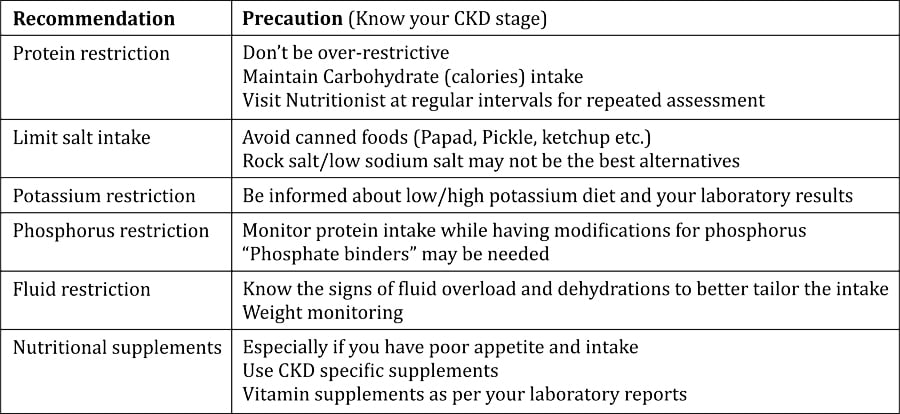Diet in chronic kidney disease patients
Dr. Ashwini Gadde, MD, DNB, Consultant Nephrologist Fortis Memorial & Research Institute, Gurgaon


 Kidneys do one of the important functions of filtering the waste and excess fluid from the body. Irreversible damage to their function is called Chronic Kidney Disease (CKD). Since the type of food intake has impact on the nature and amount of waste generated, dietary modification is one of the integral part of CKD management with three major goals.
Kidneys do one of the important functions of filtering the waste and excess fluid from the body. Irreversible damage to their function is called Chronic Kidney Disease (CKD). Since the type of food intake has impact on the nature and amount of waste generated, dietary modification is one of the integral part of CKD management with three major goals.
Protein and Calories Requirement
Guidelines recommend a low protein diet (0.5-0.6gm/kg/day in non-diabetic 0.6-0.8 gm/kg /day in diabetic) in CKD who are not on dialysis and calorie intake of 25-35Kcal/kg/day.
Unfortunately, with this recommendation, many patients cut down or forced to cut down by care givers on dal, paneer, milk products, eggs etc. This blind practice can lead to increased frailty, increases susceptibility to infections and even premature death. Before these drastic changes are made, its important to check protein and calory content of one’s normal diet. Most of the Indian diets fail to achieve the basic nutritional needs especially of protein. Further decrease in protein intake can be harmful.
Patients on dialysis need high protein diet (1.2gm/kg/day). So diet plan should change once patient has been initiated on dialysis.
While making dietary changes for protein intake, it is important to monitor and increase calorie content or carbohydrate intake which should be maintained 30-35 kcal/kg/day. One might need to increase intake of high calorie foods like cereals, grains, fruits etc. Many a times, this remains neglected which increases chances of protein energy malnutrition.
As kidney problem advances, kidney’s ability to manage mainly water, sodium, potassium, phosphorus is limited. Dietary modifications will help achieve the lost balance.
Limit Sodium Intake (2-3gm/day)
It is important for control of blood pressure, and decreasing fluid retention. Use of canned foods, high salt foods should be avoided and salt free seasonings (black pepper, garlic powder, onion powder etc) should be used. Using rock salt or low sodium salt may not be the best option as it has more potassium.
Potassium Restriction
Maintaining potassium in normal range (not low, not high) is important for normal heart rhythm. Though most of kidney patients are at risk of high potassium, some might have low to normal potassium. Your physician can guide you about your potassium levels. Citrus fruits, dry fruits, coconut water, tomato, potato are rich in potassium. So you might need portion control/avoidance of these foods.“Leaching “ is another way to decrease potassium content of food.
Phosphorus Restriction
Dairy products, high protein diets are rich in phosphorus. You might need some restrictions of these foods, but not at the cost of excessive protein restriction. It is better to consult your Nephrologist for the same. He might prescribe you “phosphate binders" to decrease the absorptions of dietary phosphorus.
Fluid Restriction
Swelling of feet, puffiness, uncontrolled blood pressure, breathlessness are signs extra fluid in the body. You might need to limit your fluid intake to 1-1.5 L/day depending upon fluid overload status. Take your Nephrologist’s advice for better optimization. Daily weight monitoring might help you if you are repeatedly going in fluid overload which help in early action.
Whenever these dietary changes are made, patient needs frequent assessment for their nutritional status, health status so as to avoid adverse effects. Situation gets more complicated when patients have decreased appetites, and poor oral intake. They might need nutritional supplements. Choose the correct supplement tailored for kidney patients. Vitamins, iron supplementation might be necessary as per laboratory and clinical assessment.
Too stringent modifications or restrictions are difficult to follow. Unsupervised, it can be a “doble edged sword" by causing malnutrition. But with proper guidance and support of family, you can have “tasty and healthy" diet!

The pages slugged ‘Brand Connect’ are equivalent to advertisements and are not written and produced by Forbes India journalists.
First Published: Dec 26, 2022, 19:41
Subscribe Now